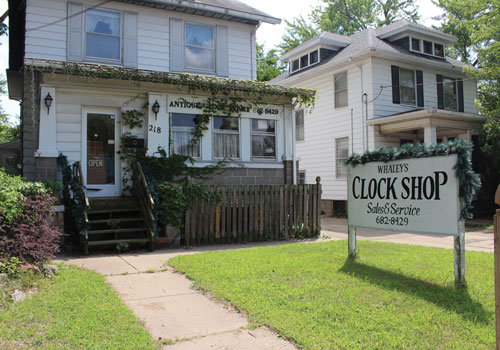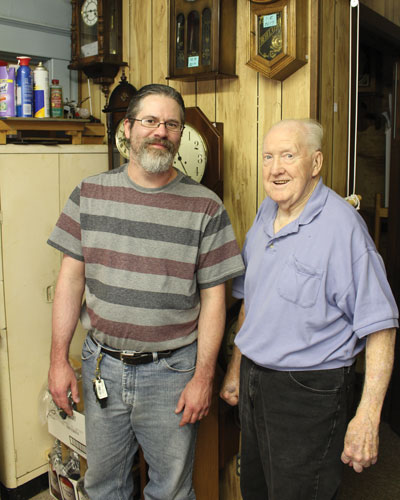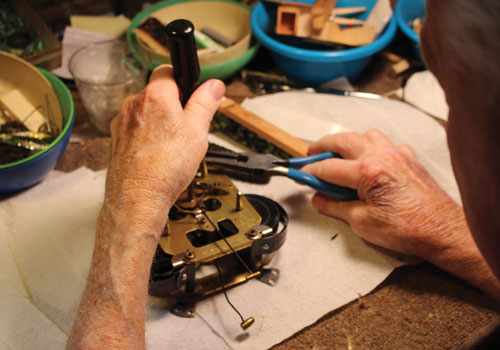A visit to Whaley’s Clock Shop is a walk through old-world craftsmanship and machines meant to endure.
You’ll know when your clock needs repaired. It starts playing tricks on you. Most clocks don’t just stop working; they’ll give you little signs.
An Atmos clock might stop responding to barometric pressure. A grandfather clock could start falling behind one or two minutes, then a couple more. A cuckoo clock may still open its doors on the hour, though no lederhosen-clad children will emerge. The metal components of a Rhythm clock will stick mid-blossom, while the melody continues on. Clocks give many subtle hints at needing repair, and there’s only one shop in town that speaks their language.

The Little Guy Left Standing
Leo Whaley opened a modest clock shop out of his home on McClure Avenue in the early 1970s. Back then, the East Bluff neighborhood thrived with commerce; Knoxville Avenue was lined with mom-and-pop shops, local druggists and nightclubs. With four properties in the family name on the block of McClure just west of Knoxville, Leo decided to utilize his properties for growing a business that included a small storefront for sales, his repair workshop, and inventory and order storage.
By word of mouth alone, he soon became the man everyone came to for all types of “little machines,” he says—antique mantel pieces, old pocket watches and even music boxes. In those days, one had "a guy" for everything from shoe repair to hat making, and clock maintenance was a commonly sought-after service.
As we know, larger retailers of mass-produced goods gradually ascended over local commerce, and the bustle along the main drag of the East Bluff slowed down. “You know, the big guy always eats the little guy,” Leo says stoically. Leo knows the “big guy” well, too; he spent years repairing gauges for Caterpillar Inc. before retiring into his lifelong hobby. Fortunately the fate of Whaley’s Clock Shop didn’t go the way of many other mom-and-pops in the area.
Leo recalls shoe repair shops moving into the basements of large department stores that decade, in last-ditch efforts to stay afloat. Specialty shops were disappearing all around him, as expansive shopping malls went up. If shoes or clothes or household items could be made more cheaply, they were—and cheaper goods weren’t worth the money spent on repairs when they could simply be discarded for something new. In the face of this trend, a good cobbler was hard-pressed to keep the door revolving. Leo gives accolades to the one shop he can think of that’s weathered the same changes as him: Fred’s Shoe Repair on North University.
As the commercial atmospheres changed, Leo lost the sales portion of his business. He’s still officially a Howard Miller luxury clock dealer, with a little inventory left in storage in the house next door to the shop. Howard Miller was an established brand when he first opened, but those tall case clocks aren’t as sought-after today. So, diagnostics and repairs became his focus, and through the years, those orders kept coming in.
It makes sense. Where else in town can you take your heirloom moondial grandfather clock for a check-up? What friend of a friend can take apart your antique Black Forest cuckoo and figure out why the goat no longer springs out of the stable door?

Brian Scobee and Leo Whaley in the shop on McClure Avenue
Tinkering and Trouble Shooting
It isn’t just niche that keeps Whaley’s Clock Shop running, but a reputation for taking great care and pleasure in restoring these valuable keepsakes. Leo fixed his first timepiece at 10 years of age, when his father set a deconstructed clock in front of him and said, “Put this back together.” He did. And he’s been fascinated by them ever since. It is a new puzzle to solve, each time he sits down to begin work.
Nancy Whaley brings in a cup of coffee, and I soon find her to be a woman of an inquisitive nature matching Leo’s own. She came along just after the shop opened, and quickly educated herself on all things clockwork. Leo seemed to perceive his wife’s equally curious spirit, so he put it to the test right off the bat. When they were first courting, he sat Nancy down at the very workbench he sits at now. “Take this clock apart,” he instructed, a glint in his eye. She did, without hesitation. “‘Now put it back together,’ he said … So I did!” Nancy smiles in Leo’s direction. “And that clock worked.”
“It just ran backward,” teases their son, Terry, who works alongside his dad in the shop. He took to Leo’s work naturally, and he also helps run the administrative side of things. As we’re chatting, he flips through handwritten orders in one of many shelved boxes, makes phone calls to customers about various repairs and pick-ups, and takes calls from clients who seem to just want to check in on his dad. The Whaley family is well-known in the area, and neighbors often pop in just to shoot the breeze.
“The boys,” Leo’s sons Terry and Brian, are the only technicians who work at Leo’s bench. “My mind likes to do jigsaw puzzles,” says Nancy, who can answer nearly any question about any clock. “I like to get to the bottom of things. But there’s a difference between figuring something out and actually fixing it. This is very hands-on, what they do.”
Through tinkering and troubleshooting, Terry has become an expert in certain repairs, as his dad will proudly tell you, such as re-soldering the intricate parts inside a musical Rhythm clock. It’s an extremely tough fix, and father and son may well be the only two people in town who can get a Rhythm working again. Terry explains that these metal-faced clocks usually contain batteries which can send corrosion up into the mechanisms.
The sons also make house calls for their father, especially to look at the large, furniture-piece grandfathers that owners are afraid to move. Clock parts are sensitive, Nancy explains, not only to the trauma of travel, but also the changing weather and even the oil on your hands. One of the pleasures of sitting with the couple in-shop is how effectively they educate someone who, admittedly, has absolutely no experience with mechanical clocks.

Sounds Like Clockwork
I ask Leo to explain the inner workings of a cuckoo clock. This is the first clock that catches my eye when I approach his workroom. It chimes as I walk by, playing a refrain of “The Happy Wanderer” in whimsical greeting. It’s a pulley system, I learn. He shows me weights on a rope connected to one wall of his back workroom and explains the physics through demonstration. I ask if that’s what the weighted ropes are for. “No,” he says with a smile, “that’s just for the exercises I have to do.”
Later, we’re considering a grandfather clock in the corner of the sitting room; it looms larger than the rest and runs on mercury. Leo approaches me with a glass mug of liquid in one hand, as if bringing me a cup of coffee. “Here, take this mug from me,” he says. “But use both hands.” I’m perplexed, but do as instructed. I nearly drop the disproportionate weight of the mug and he smiles. “That’s how mercury does its job.”
Whaley’s Clock Shop is musical: with constant tones, ticks, creaks and small clips of melody. I ask the couple if it all starts to become white noise after a while. “Oh yes, we sleep through this.” For such a small shop, it is also very active—with customers ringing the front bell (as the sign requests) throughout the afternoon, the phone ringing every 15 minutes or so. Outside the shop, people seem to be racing through their day on very tight schedules; Leo and Nancy are comfortable in their space, noticeably lacking the anxiety surrounding it.
A phone call comes in from a customer who audibly rattles off requests and concerns about a clock they haven’t yet brought in. “Well,” Leo says calmly, “I can’t draw you a picture of that right now, but if you’d like to come in and talk about it, we’ll sure do that.” The customer promises to drop by. I have no doubt that when they do, the peace of mind will be instantaneous.
This is not an environment for rushing through a project. As Leo has learned over the years, patience and calm focus are his greatest mental tools. There will always be the next project to get to, the next order coming in. It doesn’t serve the craft or the craftsman to scatter his attention. Rather, he takes his time in getting to know every family heirloom or new technology even better than the owners themselves. As Leo admits, this is why people “talk him up,” and that is what keeps the doorbell ringing.
He also enjoys the company of customers, though he remarks that he doesn’t want “regular” customers, like most business establishments. In his mind, if he’s doing his job well, he won’t see you again for quite a while, aside from maybe dropping by to share old stories or memories.
Nancy enjoys this aspect of the shop as well. She’s a regular member of the “Memories of Peoria” Facebook group, and touted by her husband as a “true historian.” Conversation flows easily in the Whaleys’ shop and time escapes you… though someone must always keep an eye on the clock. You wouldn’t notice it in visiting, but they are ever attentive to the shelf of mantel clocks awaiting pick-up, always watching for faint communications indicating they need more servicing. This is the subtle language between clocks and their technicians. I’m just waiting to watch my favorite cuckoo come alive once more before I go. iBi
Located at 218 W. McClure Ave. in Peoria, Whaley’s Clock Shop is open Monday through Friday for walk-ins, but appointments are preferred. Call (309) 682-8429 to set up a consultation.


